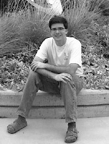SPECIAL SEMINAR FEATURING LEADING RESEARCHERS IN THE COMPUTER SYSTEMS COMMUNITY
DATE: Thursday, August 25, 2005
TIME: 11:30 am - 4:30 pm
PLACE: CIC 2101
SPEAKERS:
Richard Golding, IBM Almaden
Zygaria: Storage Performance as a Managed Resource
SLIDES - pdf [83K]Jon Howell, Microsoft Research
From Spec To Code: Formal Specification and SystemsRodney Van Meter, Keio University, Japan
Quantum Computing *Systems*: State of the Art, Summer 2005
SLIDES - pdf [1.5M]Jason Flinn, University of Michigan, Ann Arbor
Speculative Execution in a Distributed File System
 SPEAKER: Richard Golding, IBM Almaden
SPEAKER: Richard Golding, IBM Almaden
Zygaria: Storage Performance as a Managed Resource
The Kybos project at IBM Almaden is building a scalable, self-managing
storage system. The storage system can move data as necessary to meet
changing resource needs. As part of this, we have designed a hierarchical
I/O scheduling algorithm to manage the consumption of performance
resources, and implemented it in a device driver called Zygaria. This
algorithm ensures that applications receive specified throughput levels
and are throttled when they go over specified limits. The algorithm also
ensures that remaining performance resources are distributed in what we
call water-level fair sharing. In this talk I will give an overview of
the hierarchical token bucket scheme used in Zygaria, initial performance
results, and discuss how we have improved its performance.
BIO: Dr. Golding is on the research staff at IBM Almaden Research Center, where he leads the Collective Intelligent Bricks software project. Before that he was an architect at Panasas, working on a distributed object storage product, and he spent several years in the Storage Systems program at Hewlett-Packard Labs, working on projects such as AutoRAID and self-managing storage.
 SPEAKER: Jon Howell, Microsoft Research
SPEAKER: Jon Howell, Microsoft Research
From Spec To Code: Formal Specification and Systems
Systems builders often dismiss "formal" tools as only useful
in ivory towers. We used some formal specification techniques to tackle
a subtle distributed file system design problem. We found some
techniques very valuable, and others less so.
The intended audience consists of systems builders that can benefit from having new tools in their systems-building toolboxes. I will share our experience using these tools to rapidly prototype distributed system design problems, and our experience moving rapidly from a formal design to a robust implementation.
BIO: Jon Howell is a researcher in the Systems and Networking group at Microsoft Research. He has been mainly involved in the FARSITE serverless distributed file system project. His thesis at Dartmouth College focused on distributed naming and security.
 SPEAKER: Rodney Van Meter, Keio University, Japan
SPEAKER: Rodney Van Meter, Keio University, Japan
Quantum Computing *Systems*: State of the Art, Summer 2005
In this talk, I will review recent progress in quantum computing *systems*. I will start with an extremely brief review of the principles and power of quantum computing, describe a taxonomy of
quantum computing technologies from a systems point of view, then move into recent results in ion trapping, all-optical quantum computing, and error management (including quantum error correction, fault tolerance, and gate accuracy). This will allow me to place my own research on a quantum multicomputer and quantum arithmetic in context. I will finish with a list of what I consider to be the most important open problems to be attacked as we progress toward the realization of useful quantum computers.
BIO: Rod Van Meter has almost two decades of broad-ranging experience in computer systems, specializing in the intersection of networks and storage systems for most of the last decade. He has worked at both companies and research institutions in the U.S. and Japan, including USC/ISI, Quantum (the hard disk maker), and Nokia. In conjunction with his current interest in quantum computing, he has taken on the role of doctoral candidate at Keio University.
 SPEAKER: Jason Flinn, University of Michigan, Ann Arbor
SPEAKER: Jason Flinn, University of Michigan, Ann Arbor
Speculative Execution in a Distributed File System
This talk will describe a system called Speculator that improves the
performance of distributed file systems by supporting speculative execution
within the Linux kernel. Speculator allows multiple processes to share
speculative state by tracking causal dependencies propagated through
inter-process communication. It guarantees correct execution by preventing
speculative processes from externalizing output, e.g., sending a network
message or writing to the screen, until the speculations on which that output
depends have proven to be correct. Speculator improves the performance of
distributed file systems by masking I/O latency and increasing I/O throughput.
Rather than block during a remote operation, a file system predicts the
operation's result, then uses Speculator to checkpoint the state of the calling
process and speculatively continue its execution based on the predicted result.
If the prediction is correct, the checkpoint is discarded; if it is incorrect,
the calling process is restored to the checkpoint, and the operation is
retried. We have modified the client, server, and network protocol of two
distributed file systems to use Speculator. For PostMark and Andrew-style
benchmarks, speculative execution results in a factor of 2 performance
improvement for NFS over local-area networks and an order of magnitude
improvement over wide-area networks. For the same benchmarks, Speculator
enables the Blue File System to provide the consistency of single-copy file
semantics and the safety of synchronous I/O, yet still outperform current
distributed file systems with weaker consistency and safety.
BIO: Jason Flinn is an assistant professor in the Electrical Engineering and Computer Science department at the University of Michigan, Ann Arbor. His research interests include mobile computing, file systems, and operating systems.
Visitor Coordinator: Angela Miller, amiller@cs.cmu.edu, 8-6645
SDI / LCS Seminar Questions?
Karen Lindenfelser, 86716, or visit www.pdl.cmu.edu/SDI/
